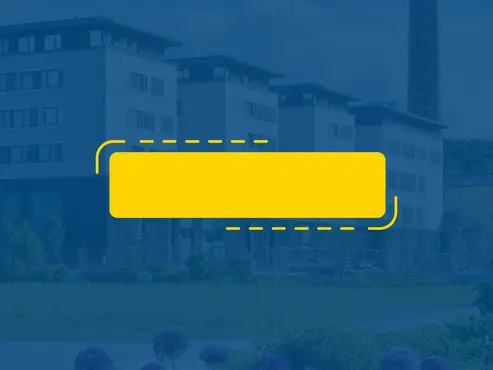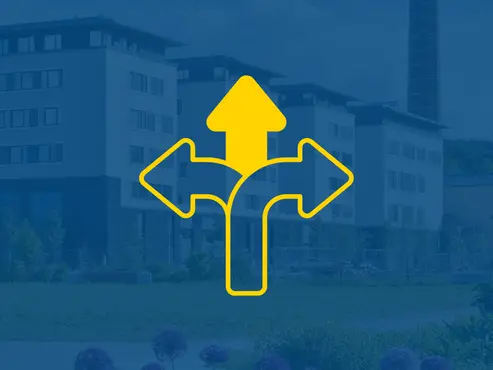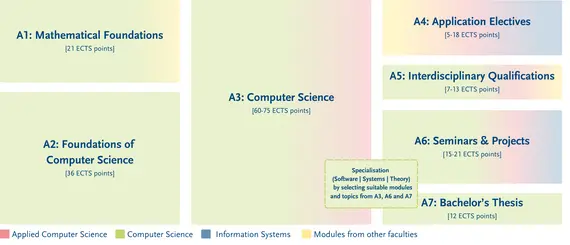Structure and Curriculum
New regulations starting in winter semester 2024/25
The start of the computer science course has been completely revamped! Additional professors have significantly expanded the range of courses on offer and established new areas of specialization. This will apply from the winter semester:

New name: The degree program is now called “B. Sc. Computer Science”.
The previous focus on “Software Systems Science” remains in the form of selectable study specializations (e.g. “Software” or “Systems”), but now there is even more!

More choices!
The compulsory program was aligned with the basic skills standardized by the German Informatics Society. This creates more room
for individual interests, new study focuses, the recognition of modules from other universities - e.g. after stays abroad or when changing degree courses - and for looking beyond the horizon and into other faculties.

New specialization available: Theoretical Computer Science
The foundation for computer systems! Do you love mathematics and want to understand and be able to prove how and why computers are able to solve the world's problems? Then this specialization is just right for you. Because nothing is more practical - and more necessary! - than a good theory.
Information on switching to the new regulation
Even if you are placed in a higher semester, the counting for the progress check starts from the beginning. You therefore have the same amount of time as first-year students to complete the modules for module group A1.
Degree Programme Structure
The bachelor’s programme in Computer Science is based on a standard programme duration of six semesters and leads to the conferral of the Bachelor of Science (B. Sc.) degree. It provides wide-ranging elective options and therefore allows students to align areas of specialization with their own interests in various fields of software systems science, particularly in programming, software engineering and in complex and distributed systems.
The degree programme is comprised of the seven module groups outlined below.
Within this module group, students learn the mathematical fundamentals that will be required for their future studies.
This module group comprises the introduction to computer science as well as other theoretical and practical basic lectures on computer science.
- Introduction to Computer Science
- Foundations of Computer Architecture & Operating Systems
- Logic & Computability
- Discrete Modeling
This module group teaches subject-specific content, e.g. software engineering and concepts relating to algorithms and data structures. Individual study specialisations can be set.
Exemplary module selection options:
Algorithms & Data Structures; Introduction to Distributed Systems; Interactive Systems; Data Communication; Database Systems; Introduction to Security & Privacy; Foundations of Software Engineering; Algorithms & Complexity; Advanced Java Programming; Introduction to Programming in C; Introduction into Systems Programming in C++; Modal and Temporal Logic; Introduction to Artificial Intelligence; Data Engineering; Foundations of Program Semantics; Project Systems Programming; Foundations of Information Visualization; Mathematics for Machine Learning
At least 5 ECTS should be completed at another faculty; other electives at the faculty of WIAI are also possible.
In addition to the Software Engineering Lab, students can do one or two seminars and one or two projects. One seminar and one project must be in the field of computer science.
In addition to the compulsory lab, students must take at least one seminar and project, with the opportunity to take up to two seminars and projects. At least one of each module types must stem from the subject area of computer science. These courses are meant to provide a more in-depth examination of specific topics in the areas of computer science, applied computer science and information systems relating to computer science. These courses therefore also prepare students for working on systematically organized team projects and foster key skills such as the presentation of project results or the target-oriented execution of goal-oriented, practical projects.
Within the scope of the bachelor’s thesis, students employ academic methods to work independently on a specified topic from the field of computer science. More detailed information concerning the choice of a subject area for the bachelor’s thesis can be found in appendix 2 of the subject examination regulations.


